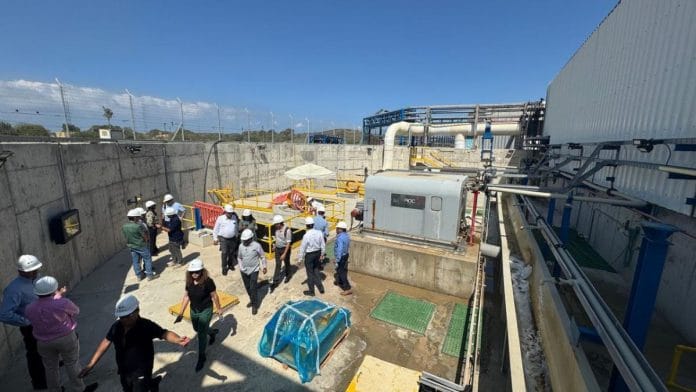Tel Aviv: The Israeli Embassy in India led a 17-member delegation of water experts and industry leaders for a seven-day knowledge-sharing trip to Israel to showcase the country’s capabilities in various aspects of water management.
The aim of introducing private Indian players to Israeli technologies was primarily to partner with these companies in advanced water-related projects, senior Israeli government officials said.
“Israel has mastered water management with the most advanced technology. Through this water delegation, we wanted to showcase how we overcame the limitation of water through innovation and strategy,” said Noa Amsalem, Israel’s water attaché to India.
She said that participants of the delegation were chosen considering their established work in the field of water.
The delegation, led by Amsalem and Neeraj Gahalawat, senior water resource specialists, Embassy of Israel in India, had picked India’s leading private companies working in the field of water management, wastewater treatment and desalination.
Adani, WABAG, Larsen and Toubro, JWIL, BVG India Limited, and Iota Water were some of the companies that participated in the seven-day knowledge-sharing group. The delegation also comprised representatives from Delhi-based environment think tank the Council on Energy, Environment and Water (CEEW).
One of the highlights of the delegation was Israel’s desalination plants. A global leader in desalination, Israel relies heavily on converting saline water from the ocean, containing a high concentration of dissolved salts, into potable water for everyday use.
These plants use reverse osmosis, where high-pressure pumps push seawater through ultrafine membranes that allow water to pass but separate salt and other impurities.
Data shows that while only 1% of the world’s drinking water goes through desalination, in Israel, over 80% of its drinking water is sourced from desalination plants.
Since 2005, when the country started heavily investing in desalination, Israel has gone on to produce over 585 million cubic metres of water annually through desalination. This, accompanied by extensive wastewater recycling—nearly 90%—has helped Israel eradicate water shortage.
Indian ambassador to Israel, J.P. Singh, said that India can learn and replicate Israel’s water-efficient models.
“Of course, geographically India and Israel are very different, and we might not be able to copy-paste the solution, but we can definitely understand the broader framework of their work and adopt the technologies that will reap us benefits back home,” Singh said.

Future opportunities for partnership
During an interactive session with the delegation, members of the Israel Water Authority said that in the future, the agency will open up several tendering opportunities for international firms. The agency said it encouraged Indian firms to participate in the bids.
“Desalination tenders—in the very near future, a preliminary selection process (PQ) for participation in the tender for the Emek Hefer desalination plant, which is expected to be one of the largest in the world, with a capacity of 400 million cubic meters, will be announced. The tender will also include the construction of a power station,” a statement read.
Officials also stressed that in the coming years, an estimated total annual investment of 1.2-1.5 billion NIS (approximately 350 million euros) is expected in the construction and expansion of wastewater treatment facilities.
The author was part of the delegation that travelled to Israel on the invitation of the Embassy of Israel in India.
(Edited by Viny Mishra)
Also read: India to be in water stress by 2030, Jal Shakti Ministry confirms in Rajya Sabha response







Simping after colonisers and genocidal terrorists. A terrorist country is lauded for its technological prowess. Not to mention the fact that it is all for the benefit of a bunch of capitalists. All different sides of the same coin.
Everything about this article is disgusting.